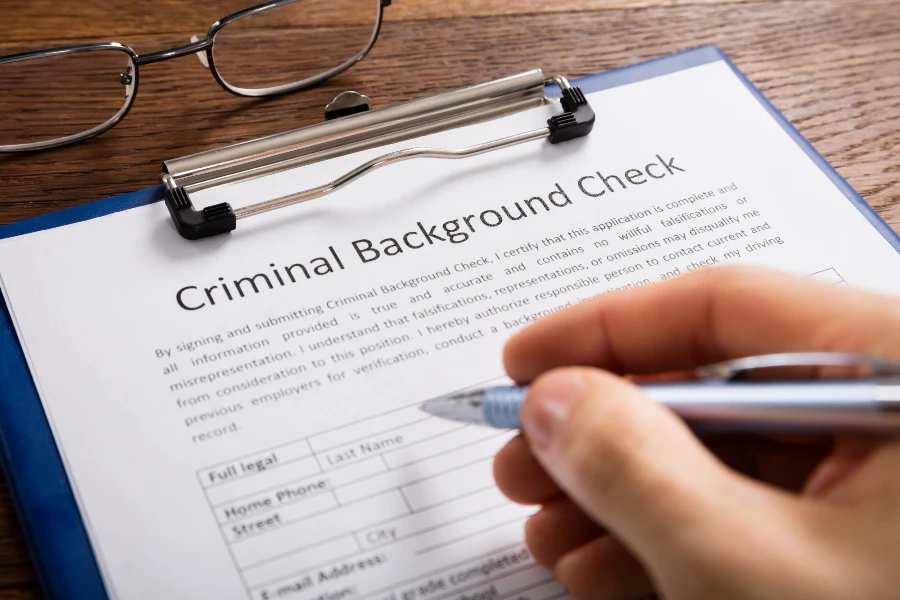
Home to countless American landmarks and vacation destinations, Texas sees millions of visitors each year, in addition to hosting more than 29 million permanent residents.
Inevitably, thousands of Texans and people visiting Texas end up facing charges for DWI at some point or another.
After the State files charges against them, many clients want to know: Will a DWI affect a background check for me?
Unfortunately, the answer is almost always yes. If someone runs a background check on you, they will likely see your DWI arrest or conviction.
A DWI on your background check can keep you from obtaining certain jobs, disqualify you from some scholarship opportunities, and result in higher car insurance rates.
If you have questions about a DWI arrest showing up on your background check, contact Austin Hagee Law Firm today.
Our DWI lawyers have the knowledge and experience necessary to answer your questions and help guide you through this time.
Does a DWI show up on a Background Check if I do not get Convicted?
A DWI arrest will still appear on your background check, even if the prosecutor eventually dismissed your charges or reduced them to something like reckless driving or obstruction of highway.
Expunction
In some cases, you can get a misdemeanor removed from your criminal record as long as you were not convicted.
Texas considers a typical DWI charge a Class B misdemeanor. However, it can increase to a Class A misdemeanor if the driver’s BAC was at or above 0.15%.
Texas law prohibits anyone from expunging a DWI conviction from their record.
However, if a DWI charge is dismissed before trial without a probation sentence or final conviction, the charge is eligible for an expunction once the statute of limitations expires.
Additionally, you qualify for an expungement if you proceed to trial and are found not guilty. Expunction means the court will delete and destroy all records related to your DWI charge, including arrest records.
Petition for Nondisclosure
The alternative to an expunction order is a petition for nondisclosure, often referred to as getting your record sealed.
Individuals who agree to deferred adjudication and complete a term of probation qualify to seal their records in Texas.
The nondisclosure order prevents private parties like landlords and businesses from obtaining your arrest record. However, government agencies and law enforcement can still access your full criminal history.
If you are interested in a nondisclosure, contact a San Antonio DWI lawyer at Austin Hagee Law Firm today to discuss whether you qualify to expunge or seal your DWI charge.
Consequences of a DWI Charge or Conviction
A DWI arrest or conviction on your record can permanently impact several aspects of your life. For example, your insurance company may increase the cost of your coverage if you get convicted of DWI.
Higher insurance premiums are the last thing you want to think about when your freedom is in jeopardy.
Additionally, a DWI can affect your current employment status and your ability to secure different employment opportunities in the future.
If you drive a company vehicle for work and lose your driving privileges due to a DWI conviction, it can affect your ability to perform your job responsibilities.
Also, people with DWI arrests are sometimes looked at as having substance abuse problems and cannot hold jobs where they have access to controlled substances (e.g. medical field and nursing) or operate heavy machinery for liability reasons.
A DWI arrest can affect you in more areas of your life than you may realize.
A San Antonio criminal defense attorney gives you the best opportunity to avoid DWI charges at the outset and have the opportunity to obtain a nondisclosure order to seal your criminal record.
How to Apply for an Expunction or Nondisclosure Order
You can apply for an expunction by filing a petition for expunction with the application district court which has jurisdiction over your charges. The petition must contain:
- The petitioner’s name;
- The offense charged;
- Date of the arrest;
- How and when the charge was resolved;
- Name of arresting agency; and
- Case number, if applicable.
Contact a member of our team to help you complete and file your petition for expunction. Any mistakes in your petition can result in your expunction being denied.
After you file the petition, the court will hold a hearing where involved parties can contest the expunction. The court can take between six and eight weeks to make a decision.
If the court grants your petition, the judge will sign an order of expunction, which is sent to municipal, state, and federal agencies directing them to destroy records of the offense.
The process for obtaining a nondisclosure order is similar to obtaining an expunction. You file the order for nondisclosure in the court that has jurisdiction over sealing your initial charge.
The court will provide notice to relevant parties and hold a hearing on whether to grant the nondisclosure order. The judge can deny the order if doing so would best serve the interests of justice.
A member of our team can help you determine if you qualify for an expunction or a nondisclosure order in Texas.
What is the Difference Between an Expunction and a Nondisclosure Order?
An expunction means information about your arrest or charges are removed from your public criminal record. Additionally, you can deny the incident occurred on job and apartment applications.
A nondisclosure order does not remove the information from your criminal record, but it limits who can access the information.
A nondisclosure prevents certain private parties from seeing the charge or arrest on your record. Government agencies can still access the criminal record after a nondisclosure, but not after an expungement.
Will a DWI affect a Background Check? An Attorney at Austin Hagee Law Firm Can Answer Your Questions
A DWI arrest does not need to negatively affect the rest of your life. Our DWI attorneys can help determine if you qualify to have your criminal record sealed or expunged.
With experience as prosecutors, our attorneys have in-depth knowledge and vast resources to ensure your DWI record does not hurt you forever.
Whether you need a lawyer to help you fight current DWI charges or seal an old DWI arrest, our attorneys at Austin Hagee Law Firm can help.
Contact our office today to schedule an appointment with a DWI attorney.
